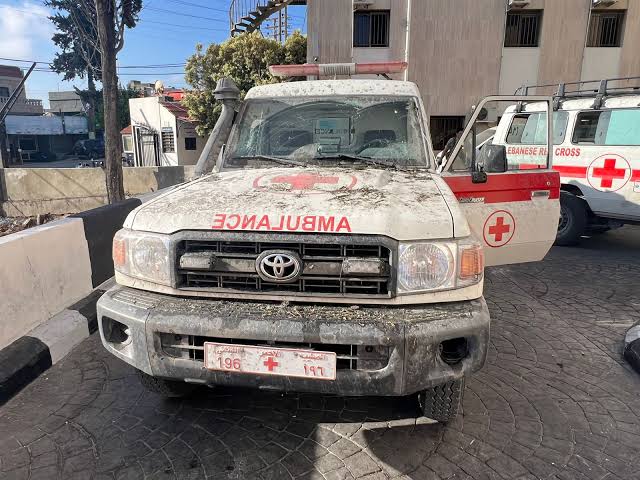
Israel’s clear and continued pattern of targeting relief and ambulance teams in Lebanon is a serious violation of international law, especially international humanitarian law. Since the start of its most recent attack on Lebanon, the Israeli army has launched numerous military attacks directly against ambulance and relief crews, particularly those affiliated with the Islamic Health Authority, killing at least 120 medical and relief workers.
With no proof, an Israeli army spokesperson recently justified the targeting of paramedics and their vehicles in various parts of Lebanon by claiming that they were transporting “saboteurs and weapons”. In this regard, the Israeli army targeted on Sunday morning, 13 October 2024, a Red Cross relief convoy in the southern town of Sarbin, wounding four volunteers. This attack came after the Israeli army targeted a house in Sarbin in an initial airstrike, and then targeted the same site in a second airstrike after the Red Cross convoy arrived to search for the injured.
This targeting took place even though the Red Cross had previously arranged to visit the site alongside UNIFIL, the United Nations peacekeeping force in southern Lebanon. The Red Cross reported that the airstrike damaged its vehicles in addition to injuring four members of its team.
The Israeli army also targeted two aid trucks today (Monday 14 October), which were passing through the Ras Baalbek area. The trucks were flying Red Cross flags after receiving UN approval to deliver aid, according to official Lebanese sources. The bombing smashed the windows of the two trucks and injured the driver of one of them. The Israeli targeting in Lebanon follows the same pattern as in the Gaza Strip, raising the possibility that aid trucks may be targeted directly and repeatedly in the future under false pretenses and pretexts.
The Red Cross must be respected as a neutral and impartial organisation that conducts humanitarian work in field operations that assist and protect people who do not participate in, or have ceased to participate in, hostilities. Its mission is to alleviate human suffering and promote respect for the rights of those affected by armed conflicts and other situations of violence. It is required to protect these individuals, and to take all reasonable precautions to limit the impact of hostilities on them. The warring parties have a legal, moral, and humanitarian duty to protect medical and relief workers and not impede the delivery of aid.
Article 35 of the First Geneva Convention, and Article 21 of the Fourth Geneva Convention, both mandate the protection of medical transports. Article 21 of Additional Protocol I broadened the scope of this obligation to include civilian medical transports in addition to military medical transports under all conditions. This is supported by Rule 29 of customary international humanitarian law, which mandates that medical transports that are only used for medical transport must always be respected and safeguarded.
According to the Rome Statute of the International Criminal Court, attacking medical facilities and transportation vehicles that use the distinctive emblems listed in the Geneva Conventions, in accordance with international law—including emblems belonging to the Red Cross—as well as attacking personnel, facilities, materials, units, or vehicles used in a humanitarian assistance mission constitutes war crimes under the Rome Statute. These crimes are also considered crimes against humanity because they are committed against civilians, particularly killing and willfully causing serious bodily harm or physical health. These crimes are part of Israel’s massive attack on the civilian population in Lebanon.
The international community must therefore fulfill its obligations to uphold and implement both international humanitarian and human rights law. It must put an end to Israel’s serious crimes against unarmed civilians in both the Gaza Strip and Lebanon, including its deliberate targeting of ambulances and relief teams that transport and evacuate the wounded, and ensure the freedom of passage of all medical and humanitarian missions. Targeting civilians and impeding the delivery of aid and relief to them indicates the intention to purposefully kill people not involved in fighting and military operations.








